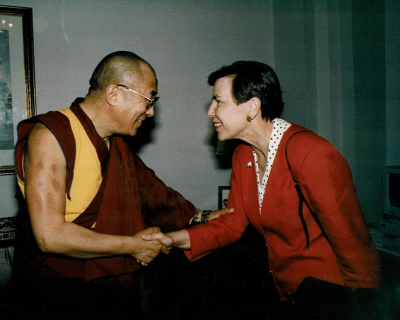Words of Wisdom from Former Congresswoman and Columbia Riverkeeper Co-Founder Elizabeth Furse
By: Columbia Riverkeeper


Raised in South Africa, Elizabeth Furse’s activism against apartheid set the stage for a life of activism and commitment to civil rights. Furse served three terms in Congress before retiring in 1998 and devoting her life to many progressive causes. In 2000, Furse played a pivotal role in bringing together local Columbia River nonprofits to form Columbia Riverkeeper—the first environmental nonprofit dedicated to protecting the Columbia, from the headwaters to the Pacific Ocean.
Tell us about the early days of Columbia Riverkeeper.
I found the Riverkeeper model fascinating: bringing together people at the neighborhood level and then connecting neighborhoods to other neighborhoods, eventually building a chain of river communities.
I was invited to dinner with Bobby Kennedy Jr. in Portland, and he asked if I would consider pulling together local river groups to start a Columbia Riverkeeper. I thought it was a great idea. We convened a small board, including John Platt, Thane Tienson, Don Sampson, and others. Columbia Riverkeeper is not an ancient organization, and I’ve been so impressed by the accomplishments in that relatively short time.
You lived in California in the 1970s and became active in the United Farm Workers movement led by César Chávez. What lessons did you draw from that experience?
You must listen to people on the frontlines. César Chávez did that. He knew what a farmworker experiences. I had the opportunity to meet Mr. Chávez and was incredibly impressed. When I came to the Pacific Northwest, I drew on the lessons I learned in California, and South Africa, and became intensely involved with the tribal fishing-rights struggle. I met Billy Frank Jr. (a tireless advocate for Indian treaty rights and environmental stewardship, whose activism paved the way for the U.S. Supreme Court’s “Boldt decision,” which reaffirmed tribal co-management of salmon resources in the state of Washington). He was arrested 51 times for exercising his treaty fishing rights. I once looked at his resume and said, “Why weren’t you arrested during this four-year period?” He said, “I was serving in the Marines.” That stayed with me.
What advice do you have for Riverkeeper members who want to influence a member of Congress?
Be persistent and well-organized. Do your research. And get to know a staff person. In many cases, my staff brought issues to me that constituents presented to them. They are the hands and the brains for a member of Congress. You don’t have to go to D.C. Find the staffer in your own city. Get to know them. A Gulf War veteran from Portland once came to see me in D.C. In the Gulf War, the bullets were dipped in uranium so they can tear through a tank. But soldiers handling bullets were not told about the uranium. This man had serious medical issues and couldn’t get the Department of Defense’s attention. He helped change the law.
How did Hanford’s nuclear legacy influence your work on nuclear non-proliferation?
Tribal nations came to me and were terribly concerned about the Hanford Reach—a huge fishing area. They alerted me about what they saw. Unfortunately so many electeds don’t listen to tribal nations even though they’ve been here for thousands of years.
Share your darkest, most disappointing moment as a legislator. How did you overcome defeat?
Our failure to stop the salvage logging rider, an open door to more old-growth cutting. Representative Peter DeFazio and I became very involved. We got within four votes. When we lost, I said to myself, “How do you help the people who worked so hard on this—and how do I recover and go back?” My mother taught me that, wherever you are, there is an issue that needs help, and it is your duty to do something about it. Our work is never done.
What’s your advice to young activists?
You get so much more out of activism than you give. And you meet the most amazing people. Nelson Mandela. Martin Luther King. César Chávez. I would not have met them but for my activism. I’ve seen amazing change in my life—change I never imagined possible. I went to Nelson Mandela’s inauguration. As a child growing up in South Africa, I never thought such a day would come without blood in the streets. Activism is an amazing life.
**Photo: Furse keeps this photo of her meeting the Dalai Lama on a table near her front door. Photo courtesy of the author.